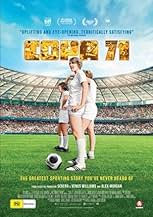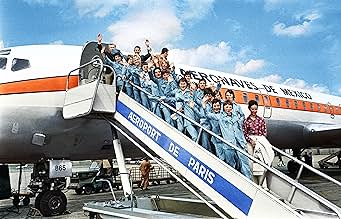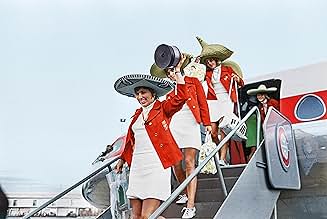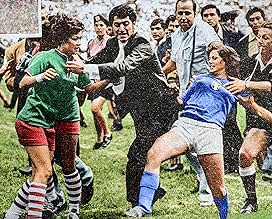Donne pioniere raccontano le loro rivoluzionarie esperienze al Mondiale di calcio femminile 1971, un torneo popolare eclissato dalla storia fino ad ora.Donne pioniere raccontano le loro rivoluzionarie esperienze al Mondiale di calcio femminile 1971, un torneo popolare eclissato dalla storia fino ad ora.Donne pioniere raccontano le loro rivoluzionarie esperienze al Mondiale di calcio femminile 1971, un torneo popolare eclissato dalla storia fino ad ora.
- Regia
- Sceneggiatura
- Star
- Premi
- 2 vittorie e 10 candidature totali
Jaime De Haro
- Self
- (voce)
Stanley Rous
- Self
- (filmato d'archivio)
Recensioni in evidenza
Cried a few times wihle watching it and created my account for it. I hope more people could watch it. Probably the best documentary of the year. I play football, too. Just started learning it for a month. I'm in my 20s but I wish I could start as a kid. But it is never too late to learn and play. Growing up as a girl I never thought I can play it too. Until watched the euro Cup 2022. I wish more girls or adult women would join us. Let's play football, Sis.
Cried a few times wihle watching it and created my account for it. I hope more people could watch it. Probably the best documentary of the year. I play football, too. Just started learning it for a month. I'm in my 20s but I wish I could start as a kid. But it is never too late to learn and play. Growing up as a girl I never thought I can play it too. Until watched the euro Cup 2022. I wish more girls or adult women would join us. Let's play football, Sis.
Cried a few times wihle watching it and created my account for it. I hope more people could watch it. Probably the best documentary of the year. I play football, too. Just started learning it for a month. I'm in my 20s but I wish I could start as a kid. But it is never too late to learn and play. Growing up as a girl I never thought I can play it too. Until watched the euro Cup 2022. I wish more girls or adult women would join us. Let's play football, Sis.
This is a great documentary and a must-watch for everyone. I knew about Copa 71 before I watched the movie, but I din't know much of the details. I was crying my eyes out, out of anger and frustration.
At one point, when they interview some of the Argentinian women and they mention how little support they got from their federation, I imediately thought about last weeks news that the now active Argentinian womens team only got a banan and a sandwich for lunch at their last assembly. While progress in womens football has exploded in the last few years it is vital that we all help making sure that every country support the womens team as much as the mens team.
Anyway. Watch this movie and weep. Then rise up and organize.
At one point, when they interview some of the Argentinian women and they mention how little support they got from their federation, I imediately thought about last weeks news that the now active Argentinian womens team only got a banan and a sandwich for lunch at their last assembly. While progress in womens football has exploded in the last few years it is vital that we all help making sure that every country support the womens team as much as the mens team.
Anyway. Watch this movie and weep. Then rise up and organize.
If this documentary is not nominated to an Oscar or an Emmy, it is a crime.
The subject is quite niche but the undertones of a social statement are there. It's denouncing one of the greatest injustices in sports history. To think this was hidden for so many years just because it was a woman's event it's almost unbelievable.
The first hands stories of these pioneers are grappling and inspiring.
The perspective of those who comment through experience and how they got to the 71 event makes this probably the best sports documentary ever made.
If you believe in social causes, football, or just plain storytelling, this is it.
The subject is quite niche but the undertones of a social statement are there. It's denouncing one of the greatest injustices in sports history. To think this was hidden for so many years just because it was a woman's event it's almost unbelievable.
The first hands stories of these pioneers are grappling and inspiring.
The perspective of those who comment through experience and how they got to the 71 event makes this probably the best sports documentary ever made.
If you believe in social causes, football, or just plain storytelling, this is it.
This film brought me so much joy but also left me with a sad rage. To think of where women's football could be now if it wasn't for frail male egos. It's such a well made film and all ex players involved tell the story so well, you can see how emotional they still are and what it meant to be a part of this wonderful tournament that was hidden from history. The match footage is so well restored and it felt amazing to see it on the big screen. I just wish we hadn't been denied so many years of great tournaments and a history of great players. It ended on a positive though, as someone who regularly attends matches and follows the WSL and the Lionesses passionately I feel very confident that the sport will continue to grow. It's a testament to those wonderful players in 71.
"Copa 71" premiered at TIFF last month, and made its US debut at DocFest as part of the Seattle Independent Film Festival. It received rave reviews at both, so it's telling that as of this writing it's currently rocking a 4.5/10 on IMDb for what is probably the most egregious sin of all-- treating women like human beings.
The film has one primary focus, as shown in the title: In 1971, in Mexico City and Guadalajara, a non-FIFA Women's World Cup was held. Six teams were invited, and where the tournament holders imagined it a sideshow, they had dollar signs in their eyes and stadiums to fill (FIFA denied them the use of the regular stadiums, so they were 'forced' into the two largest stadiums in the country).
As a film, its focus is narrow, but that singular focus is so utterly fascinating, and the players so passionate, that this is hardly a complaint. The burial of this sporting event is mentioned barely at all, the film doesn't even make mention of the next (also overlooked) women's tournament in 1985, skipping to the first official FIFA sanctioned event in 1991.
These are minor concerns, as the film is necessary both as an educational tool, and as a historical document. I'm male, I've got a basic familiarity with soccer, but like all great sports documentaries, you can go in blind and be captivated by the story they're trying to tell, regardless. Yes, the open sexism these women had to deal with is still alive and well (see: the current IMDb rating), but that is less the focus than the very real fact that even in 1971, women playing soccer sold out a 110,000 seat stadium.
You can't not love these women, unless you're the unfortunate type of person who never cared for women in the first place. If that's you, you don't need to review bomb, just find something else to be mad about. Women's soccer is the fastest growing sport in the world, and this documentary is a testament that it's been a long time coming.
The film has one primary focus, as shown in the title: In 1971, in Mexico City and Guadalajara, a non-FIFA Women's World Cup was held. Six teams were invited, and where the tournament holders imagined it a sideshow, they had dollar signs in their eyes and stadiums to fill (FIFA denied them the use of the regular stadiums, so they were 'forced' into the two largest stadiums in the country).
As a film, its focus is narrow, but that singular focus is so utterly fascinating, and the players so passionate, that this is hardly a complaint. The burial of this sporting event is mentioned barely at all, the film doesn't even make mention of the next (also overlooked) women's tournament in 1985, skipping to the first official FIFA sanctioned event in 1991.
These are minor concerns, as the film is necessary both as an educational tool, and as a historical document. I'm male, I've got a basic familiarity with soccer, but like all great sports documentaries, you can go in blind and be captivated by the story they're trying to tell, regardless. Yes, the open sexism these women had to deal with is still alive and well (see: the current IMDb rating), but that is less the focus than the very real fact that even in 1971, women playing soccer sold out a 110,000 seat stadium.
You can't not love these women, unless you're the unfortunate type of person who never cared for women in the first place. If that's you, you don't need to review bomb, just find something else to be mad about. Women's soccer is the fastest growing sport in the world, and this documentary is a testament that it's been a long time coming.
Lo sapevi?
- QuizCarol Wilson, who played was the England captain in the tournament, was only 19 years old at the time. Three of her teammates, Leah Caleb (age 13), Gill Sayell (14) and Chris Lockwood (15) were still schoolgirls when they played in the tournament.
I più visti
Accedi per valutare e creare un elenco di titoli salvati per ottenere consigli personalizzati
- How long is Copa 71?Powered by Alexa
Dettagli
- Data di uscita
- Paese di origine
- Siti ufficiali
- Lingue
- Celebre anche come
- Copa '71 - succén som tystades ner
- Aziende produttrici
- Vedi altri crediti dell’azienda su IMDbPro
Botteghino
- Lordo in tutto il mondo
- 197.067 USD
- Tempo di esecuzione
- 1h 30min(90 min)
- Colore
- Proporzioni
- 2.00 : 1
Contribuisci a questa pagina
Suggerisci una modifica o aggiungi i contenuti mancanti
























